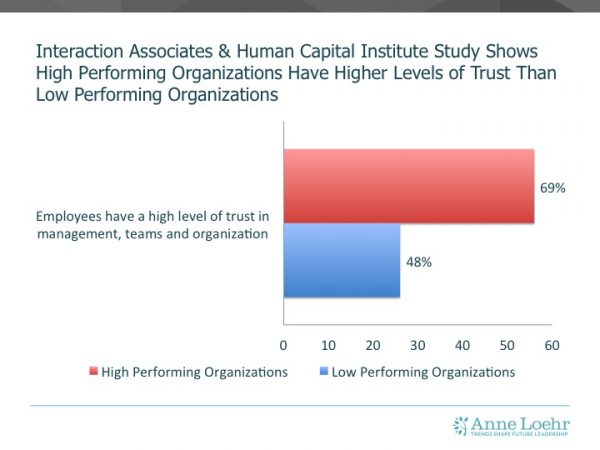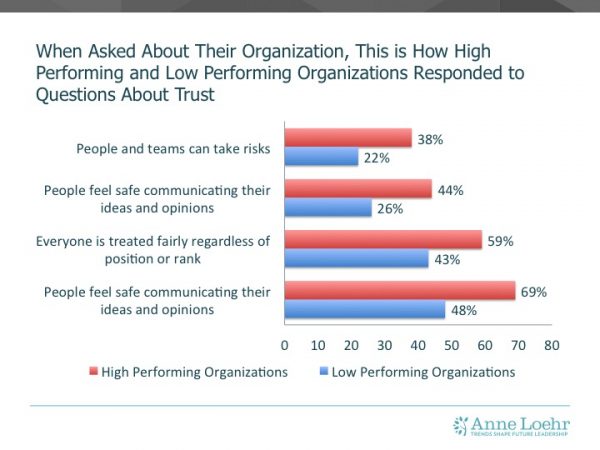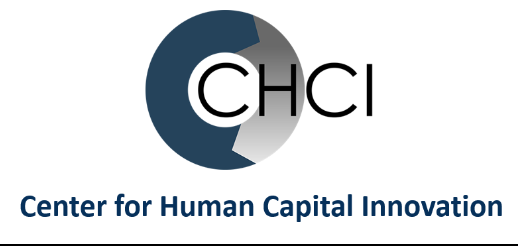
Three Ways to Develop Trust at Work
Emmanuelle looks around the room at the sales team. She’s new at the company and still learning about the relationship dynamics between her coworkers. Tensions are running high as it was just announced that the team didn’t make their sales goal for the second month in a row. Not that she’s surprised.
This past month, the marketing assistant was asked to create a pitch deck from scratch for a potential client in Canada—a large hospitality brand. Emmanuelle found out later that he’d never created a pitch deck before yet wouldn’t ask anyone for help. The marketing manager knew that he wasn’t very experienced yet was too focused on meeting her personal goals to offer guidance.
The major blow came when the marketing assistant waited until the day before the account director was flying to Canada to meet the client, to hand over a few poorly organized slides that covered only a fraction of the information needed. Not to mention that the hyper-analytical language he used that wasn’t appropriate for a luxury hotel brand.
The poor account director had to pull an all-nighter to get the deck done himself, before pitching with red eyes on zero sleep. The result? That client is no longer a potential.
Why is This Team So Dysfunctional?
Emmanuelle has been racking her brain trying to figure out how to navigate this new playing field. What’s going on with this team? Why is it so dysfunctional?
Just because the necessity of teamwork has been preached to us since childhood doesn’t mean we’re inherently good at it—or even like it for that matter. Working with other people can be challenging, even more so in the workplace when stakes are high. So now that we’re off the little league field, what can we, as working adults, do to have a positive and winning team? According to Patrick Lencioni, there are five core areas where dysfunction can be seen in teams: lack of trust, fear of conflict, avoidance of commitment, lack of accountability and not results-focused.
In Emmanuelle’s case, her team has a major trust deficit. Teams that don’t have trust don’t function well. Let’s take a look at the importance of trust, what teams with and without trust look like, and how we can start building trust in our own teams starting today.
Great Teams Have Trust
Here are some facts about teams and trust:
- Interaction associates & human capital institute study shows high performing organizations have higher levels of trust than low performing organizations

- Interaction associates & human capital institute study shows high performing organizations have higher levels of trust than low performing organizations

So the studies tell us high performing teams have trust, but what exactly does a team with trust look like versus a team without trust?
Teams with and Without Trust: What They Look Like
Teams that don’t have trust:
- Conceal weaknesses and mistakes from each other
- Hesitate to ask for help or feedback
- Jump to conclusions about other’s intentions
- Don’t offer help outside of their own areas of responsibility
- Fail to recognize and tap into one another’s skills
Teams that have trust:
- Admit weaknesses and mistakes, ask for help
- Give one another the benefit of the doubt
- Take risks in offering feedback and assistance
- Accept questions and input about their work
- Appreciate and tap into one another’s skills
- Offer and accept apologies
- Look forward to opportunities to work as a group
From $200 a Week to a $30 Billion Valuation: What Airbnb Can Teach Us About Trust

A great example of how trust can benefit a team can be seen in the now uber successful Airbnb. In 2009, Airbnb was close to going bust with only $200/week in revenue. Searching for answers outside of data, they noticed a pattern – the listing photos were bad. Without any data to back it up, the co-founders decided to travel to NYC, rent a pro camera & take pictures of listings. Revenue doubled within a week.
Without trust, the founders wouldn’t have been willing to try out an idea that had no data to back it up. In fact, they probably wouldn’t have shared that idea if they didn’t trust each other. And this idea prevented them from throwing in the towel. Now with the company valued at $30 billion, their trust was worth its weight in gold.
Now that the founders of Airbnb have seen the great benefit of trusting new ideas, and allowing for vulnerability, new hires are asked on day one to come up with new features to try out. They appreciate and tap into their employees’ skills and want them feel comfortable making mistakes. They’ve seen first-hand the benefits that can come from this type of team.
Sound Familiar?
If you’re reflecting on your team and realizing it might be lacking in trust—don’t run for the hills just yet. Trust isn’t a “you have it or you don’t” thing—it’s something that takes effort and awareness. If you find yourself in a team suffering from lack of trust, try these three tips. You can start using these tips as soon as today to help get your team on track!
Three Tips for Developing Trust at Work
1. Be Honest
- Tell the truth
- Be honest when sharing information, even if it it’s to your disadvantage
- Use truthful nonverbal communication
- Experts say more than half communication is nonverbal
- Look people in the eye, use open body language
2. Communicate Openly
- Talk to your team members in an honest, meaningful way
- Listen deeply for what’s being said, and not being said
- If you have important or relevant information, share it immediately with the team
- Meet face to face regularly
3. Meet face to face regularly
- Share personal stories
- Ask questions (sensitively) about colleague’s family, hobbies, where they’ve lived, etc.
- Don’t underestimate casual social activities after work
So let’s get back to Emmanuelle’s team—the team that for two months straight hasn’t reached their sales goals.
If the marketing assistant had trusted his manager, he would have asked for help with the pitch deck, knowing that he wouldn’t be reproached. He wouldn’t have hidden the fact that he didn’t know what he was doing. And if his manager trusted the team, she wouldn’t be only focusing on her goals, while ignoring the goals of the team. She would have made it a priority to check in with the assistant, knowing his inexperience warrants a little extra attention, for the benefit of everyone involved.
Imagine how this situation would have turned out if the team had trust—the deck would have been completed well and on time, the account director wouldn’t have had to drop his responsibilities to stay up all night and fix a deck. Instead, he would have been well rested and prepared to land a new client. And you know what? They may have a large luxury hotel brand on their roster—if only they had trusted each other.
Do you have trust at work? Yes or no, how can you tell? Let’s talk about it.
Leave a comment below, send us an email, or find us on Twitter.


Leave A Comment